Wo Fat interview with Kent Stump
While Wo Fat may play some of the darkest riffs I’ve ever heard, there seems to be a real sense of life to their music, each song has a personality and feeling all its own. Unified by precise machine gun tight drums, fuzzy thundering bass and utterly gnarled guitar which seamlessly switches from rhythm to lead in a split-second. While the band’s first album was more concentrated on short five and six minute pieces, as they’ve progressed Wo Fat has moved into a territory where they turn on a dime and shift from the afore mentioned songs to incredibly intense psychedelic explorations of their sound that can clock in at more than ten minutes, and won’t lose your attention for a second. With four full-length albums, a split 12” as well as a 7” and a slew of upcoming releases, Wo Fat have been busy demonstrating their awe inspiring ability to enter the studio with little more than an idea, and emerge with a full-fledged beast of a track! One of the most interesting things about listening to Wo Fat is the myriad of influences that are there, especially once you start digging. While it’s all pretty well presented in the format of a stoner/doom metal framework, the room that the band leaves for their own personal touch is what sets this music apart from your run on the mill stoner and sludge rock. The solos aren’t forced either, they don’t sound needless or go on forever, when it’s time to ride a riff and give it room to breathe guitarist Kent Stump is ready, willing and able. There’s no tinge of crappy 80’s hair-metal or thrashing speed-metal here, just tortured fuzzy riffs, that crescendo and fade into mindscapes of sheer feedback and distortion in these beautiful psychedelic fits. Wo Fat crafts skull crushingly effective riffs of apocalyptic thunder and simply allows the kinetic waves and vibe carry them where they may. And while the ether can be a scary place, Wo Fat is burning the light brightly to guide you through the darkness and clattering rumble that threaten to bring the walls down around you! I had heard that Wo Fat was getting ready to drop another piece of sludgetastic, doom induced psychedelic, stoner mastery on the world and decided it was high time I tracked these dudes down. Guitarist Kent Stump took time out of his busy schedule helping run his Dallas Texas recording studio, Crystal Clear Studio with bassist Tim Wilson and Michael Walter to talk all things Wo Fat with me and I am beyond stoked to present this piece. Whether you’re a longtime fan or a first time listener this is gonna be a good one, so strap yourself in and enjoy the ride!
Who all is in Wo Fat and what do they play? Has this always been your lineup or have you guys gone through some changes since the band’s inception?
Wo Fat is Kent Stump, guitar and lead vocals, Tim Wilson, bass, and Michael Walter, drums and background vocals. It has always been the three of us with the only change in the lineup being the fact that early on, we had a second guitar player named Matt Watkins. The first four songs that Wo Fat ever recorded, “Manchurian Syndrome”, “Rising River”, “From Beyond” and “Company Man”, which later became part of our first album, entitled The Gathering Dark, had Matt playing guitar as well as myself. Matt brought an edgy, freewheeling attitude to the music with his playing that I think really helped shape what I think of as the Wo Fat sound. Back when Matt was playing with us, he was living five hundred miles away from us in Kansas City, and he would try to make it down to jam with us every month or so and at that time, we weren’t getting together all that frequently anyway, so it worked fine. As time went by, things with the band were slowly getting a little more serious and it was also too hard for Matt to keep making the trek regularly so he stopped playing with us and we’ve been a trio ever since. Matt’s an amazing guitar player and the time that we played together was very influential on me.
Where are you all originally from?
I’m from Colorado originally, and ended up in Texas because I came here to go to college at the University of North Texas and just stayed here after that. Tim is originally from New York but has lived in the Dallas area since he was fairly young. Michael lived in a number of places growing up and I don’t exactly know the whole progression. He came to Texas from Oklahoma though, to go to college at the University of North Texas as well.
Did the local music scene there play a large part in your childhood or musical tastes? What was the local music scene like there?
I wasn’t here in Dallas when I was a kid, but when I came here to go to college, the music scenes in both Dallas and Denton, which is where the University of North Texas is located, about forty-five miles north of Dallas, were both hugely influential on me. I came to UNT to major in music, jazz specifically, and the scene at that time, which was the mid 80’s, was amazingly diverse and vibrant. In Denton there were not only some truly awesome jazz musicians, but there were bands of all kinds and musicians that were hip to so many different things – African music, funk, reggae, punk – and incorporating these styles into what they were doing. And in Dallas at that time there was a great underground punk scene, especially around ’85 and ’86 when I first got here. And there was also a great underground metal scene, which of course spawned Pantera, among many other great bands. I remember it feeling very alive and free in those days. Things have changed a lot since then, but all of that music that I heard that I hadn’t really been exposed to when I was a kid changed my musical priorities and the direction of what I wanted to do musically.
Was your household very musical when you were growing up? Were either of your parents or any of your relatives musicians or extremely involved/interested in music?
My household was nothing but music. Both of my parents are classical musicians and I’ve been playing music, in one way or another, pretty much my whole life. I was very aware of a lot of classical music and got into listening to and playing jazz, which is mostly what I listened to in junior high and high school, and what I went to college to study. My journey to heavy music has been a long and circuitous route. Although, I should say, there’s a lot of jazz that’s extremely heavy and most definitely influences Wo Fat.
What was your first real exposure to music?
Well, the earliest musical memory that I have is listening to “The Rite of Spring” by Stravinsky with my dad. I remember how much that piece of music really got my imagination going and how monumental it was. But like I mentioned, my whole life since I was five or six years old has been steeped in music of many, many styles. In fact, as a kid, I never considered doing anything else with my life other than playing music. It just wasn’t an option.
If you had to pick one defining moment of music in your life, a moment that redefined the universe, rewrote all the rules and opened your eyes to the endless possibilities what would it be?
That’s really tough to answer because I could probably come up with a bunch of defining moments. One thing that comes to mind isn’t so much a single moment as it is a person. When I was in seventh or eight grade, I had a music teacher that I took lessons from and he was a hardcore jazz guy, and he lived like a hardcore jazzer too, if you know what I mean. Each week when I would go to my lesson, he would give me a stack of ten to fifteen records to take home and listen to. I would record them with my cassette recorder and bring ‘em back. This began what has been a lifelong quest, always searching for more great music. It also got me interested in finding out where different styles of music came from and tracing things back to their roots. I’ve always been interested in history and this really focused me on music history, especially American music, like jazz and blues that led to rock and funk and soul, and of course later to metal and punk. This particular teacher was easily one of the most influential people in shaping my musical life. He’s a very passionate and soulful musician which was very evident in his playing which also left a very strong impression on me. Music is something that should touch you emotionally, and move you.
When did you decide that you wanted to start writing and performing your own music and what led you to that decision?
I’ve always wanted to write and perform my own music. The type of music that I want to play has changed a bit over the years, but I’ve always had that desire. I don’t know what led me to that though. It was just always there.
Where is the band currently located at?
We live in Dallas, Texas.
How would you describe the local music scene where you all are at these days?
The local music scene is kind of weird. We’ve got a great group of bands that make up a really cool stoner rock and doom scene, but it’s hard to get people to come out to shows and support the music. I think this is true of original music in general, though. People seem to really love to see tribute and cover bands rather than support bands playing their own music, which is a shame. But like I said, as far as bands go, we’ve got a really killer group of bands here in the Dallas-Fort Worth area. Bands like Mothership, Orthodox Fuzz, Southern Train Gypsy, Big Sandy Gilmer, Cosmic Trigger, Kin of Ettins, Mescalero, Little Big Horn, Black Summer Rain and Stone Machine Electric to name a few, and everyone has their own sound.
Are you very involved or interested in the local music scene? Do you book or attend a lot of local shows? Are you involved in recording or releasing any local music?
I’m very interested in the local music scene. The three of us own a studio and so we’re involved in recording a lot of local music of all kinds. Some of the bands that are in the same realm stylistically as Wo Fat that I’ve recorded are Blood of the Sun, Mothership, Stone Machine Electric and Cosmic Trigger. I work with a very wide variety of local musicians in the studio, though, ranging from jazz to country to gospel to rock. And one thing that I know to be true of the music scene here in Dallas is that there are loads of great musicians around here.
Do you feel like the local music scene has played a large role in Wo Fat’s history or do you think you could be doing what you’re doing now regardless of your surroundings or location? Do you feel like the local scene has played any part in defining Wo Fat’s sound or led to any innovations inside the band?
It’s hard to say. A huge part of what has influenced our sound has come from the records we listen to, and have listened to, in our lives. But we also learn and grow from playing shows with other bands and seeing other bands live. So I’m sure it’s a factor.
Where, when and how did you all originally meet?
Michael and I actually lived across the hall from each other in the dorm our first year a college. Tim and I met about twelve years ago when he started working at the studio that I worked at, which the three of us are now the owners of.
What led to the formation of Wo Fat and when exactly was that?
Wo Fat started around 2002 to 2003. Michael and I had been in a couple bands together before that and when I had some ideas for doing a heavily blues-based stoner rock thing, I asked Michael and Tim, who I knew was a bass player, to jam on these ideas with me. It was very sporadic at first. We would get together and jam maybe once every two or three months. At some point early on, my friend Matt, who I mentioned earlier, started jamming with us a bit too. Things started getting more regular by around 2004 or 2005 when we started playing shows, recorded the original four song EP and then, after that, The Gathering Dark.
What does the name Wo Fat mean or refer to? Who came up with it and how did you go about choosing it?
Wo Fat was a super villain in the 70’s TV show Hawaii Five-0. I’ve always dug the original Hawaii Five-0 series, although I think the new remake is crap and has nothing to do with the original vibe. I just thought the name was cool and was a somewhat obscure 70’s culture reference. Also the original Wo Fat character was this sinister evil mastermind, that also had this aura of Far Eastern mystery and vibe. It’s kind of a drag that this new network TV version of Hawaii Five-0 has kind of ruined the mythos of the Wo Fat character.
Is there a shared mantra or collective ideal that Wo Fat lives or operates by?
We do have some parameters and beliefs about the music we play that kind of govern what we do. Melodically, we use pretty much a blues-based pentatonic vocabulary. We also really want everything to have a good, hard groove to it, which to me is also something that emanates from the blues. We try to keep a good amount of freedom and improvisation in our music alongside the structure as well.
There’re a lot of things that I love about music and there’s a lot of things that I’m good at when it comes to talking about music. Describing it has never been one of those things. Rather than me making some strange and meandering attempt at describing your sound to our readers who might not have heard you yet, how would you describe Wo Fat’s sound in your own words?
Describing our music is hard for me to do because I know what we’re going for, but I don’t really know how others perceive it. It’s hard for me to step back and have an objective view of it. To me, I think of it kind of like a mix of Hendrix with Black Sabbath, but with a Sleep kind of heaviness. Heavy riffs with lots of extended jam sections.
You’re music is so dense and there’s such a wide diversity of sound and influences on your albums it’s hard to pick all of them out, even if you sit down with that intention! I’m extremely curious to hear who you would list as your personal musical influences? What about major influences on the band as a whole rather than individually?
That would be a pretty long list, but for me personally, some that come to mind would be Hendrix, Tommy Bolin, Sleep, Black Sabbath, Cactus, John Coltrane, Mahogany Rush, Point Blank, Blackfoot, Penance, Blood Farmers, Trouble, R.L. Burnside, Junior Kimbrough, Howlin Wolf, Mississippi Fred McDowell, Fu Manchu, ZZ Top, Orange Goblin, Church of Misery, Deep Purple, Wino (and all of his various projects), Earthride, Earthless, Funkadelic, Betty Davis, Sly Stone, Electric Wizard, Acid King, Blind Willie Johnson, John Lee Hooker, Reverend Charlie Jackson, Reverend Louis Overstreet, Bongzilla, Ufomammut, Atomic Bitchwax, The Sword, Kyuss, Robin Trower, Roachpowder… I could go on for days. I would say that everyone I just mentioned also carries a good bit of influence on the band as well.
While we are talking so much about your history let’s take some time to talk a little bit about Wo Fat’s songwriting process. Is there someone who comes to the rest of the band with a riff or more finished idea to work out and compose with the rest of the band? Or is it more of a collective process where songs are built from jamming together as a band, or a combination of the two?
Most of the songs are written by me, but Michael also writes some. He’s written one song on each of the last two records and he wrote one for the new record as well. Usually the way we work is this: I (or Michael) will bring in song ideas, usually kind of fragmented, and we’ll jam on the ideas. We record every rehearsal, so we can hear what’s working and what isn’t. I usually have a pretty good idea of what I have in mind for a song, but that sometimes changes or mutates after hearing how we jam on a groove, or hear how it develops into something else after playing it. Things will take shape and solidify after a few rehearsals. Lyrics, for me anyway, always come last, after the riffs and the form have been written. Sometimes I’ll then have to change a riff a little bit here and there to make it possible to play and sing it simultaneously, which can sometimes be hard depending on the complexity of the riff. Although this sounds like the songs are fairly structured, there are often sections that are pretty open with only partially solid grooves which allows us to jam a bit. Some of our songs have either been complete jams done in the studio with very loose structural ideas, or have big sections of them that are like this. For example, “The Spheres Beyond” from Psychedelonaut was a jam in the studio that we added some additional tracks to after the fact. The whole opening five or six minutes of “Shard of Leng” is also a jam where we had a loose groove concept and we knew how we would get out of it and onto the rest of the song, but it was completely open ended when we recorded it, or when we play it live for that matter. Improvisation, whether it’s a solo or just improvisation within a groove, is important to our aesthetic and artistic approach. I’m not somebody that works out guitar solos and plays them the same live as on the record, they’re improvised every time, even though I may use similar ideas as a jumping off point. Kind of like Hendrix would do. I also like the fact that within our grooves, there’s room for spontaneity, mainly from Michael’s drumming. A lot of the grooves will be fairly static and stay the same, but there’s an understood freedom that we have. In some songs more than others.
What about recording? Do you all enjoy recording? As a musician myself I think that most of us can appreciate the final result of getting the music recorded and released, there’s not a whole lot in the world that beats holding an album knowing that it’s yours and you made it. Getting into the studio, or even recording the material on your own, can be extremely stressful especially when it comes to a whole band having to record. What is it like recording with Wo Fat?
We love recording. It can be stressful, especially if there are deadlines. And for me it can be a somewhat difficult job because I engineer and mix as well as play guitar and sing, so I’m working on both sides of the glass simultaneously.
How do you all handle recording? Do you go into the studio or is it a DIY, on your own time, turf and terms kind of thing?
It’s a bit of both because we’re now the owners of one of the premiere studios in the Dallas area, Crystal Clear Sound, where I’ve worked as an engineer for sixteen years and Tim has worked for over ten years. So yes, we go into a real studio to record, but like I said before, I do the engineering and we mostly fit it in when the studio schedule is free. Although there are times when we need to get some things accomplished in a timely manner and we will have to reserve the time. We work very efficiently in the studio because the available time can be somewhat limited, even though it may seem like we’re doing it on our own terms.
Does Wo Fat do a lot of work getting song compositions and arrangements worked out before you record? Or is it more of an organic process where things have room to change and evolve during the recording process?
Once again, it’s a bit of both. The songs are composed and arranged before we go into the studio, but, like I mentioned earlier, there are usually sections of songs that are open-ended or have just a loose groove concept that we will use as a jumping off point, and we’ll improvise and jam. We’ll have certain signposts or cues that I may play on the guitar that signal that we’re moving on to the rest of the song, or sometimes I’ll just look at Michael and Tim and give them a visual cue that we’re moving on. Musical communication between us is key, so it’s very organic in a lot of ways. This is also true of any solo. As I said before, I never work out solos in advance, so they’re improvised during the recording process. Each record we get closer and closer to having all of the foundational tracks cut live together, including solos. With the newest record, The Conjuring, almost all of the guitar solos were recorded live altogether when we laid down the basic tracks. This kind of communication, interplay and unpredictability are important parts of our music. We try to push ourselves playing-wise, and want the recording to feel live and on the edge, like we’re really going for it, like we do live, which is what we’re doing. This is also why we don’t try to make everything perfect. We’re more concerned about things grooving and feeling real, alive and organic than we are about perfection. Organic is such a great way of describing it actually. We try to make music that is very organic, emotional and human.
You guys have got several albums so let’s take some time talk about your back-catalog just a little bit. Your first album was 2006’s The Gathering Dark for Red Menace/Nasoni Records. Can you share some of your memories of recording that first album? Was it a fun, pleasurable experience for you all? Where and when was it recorded? Who recorded it? What kind of equipment was used?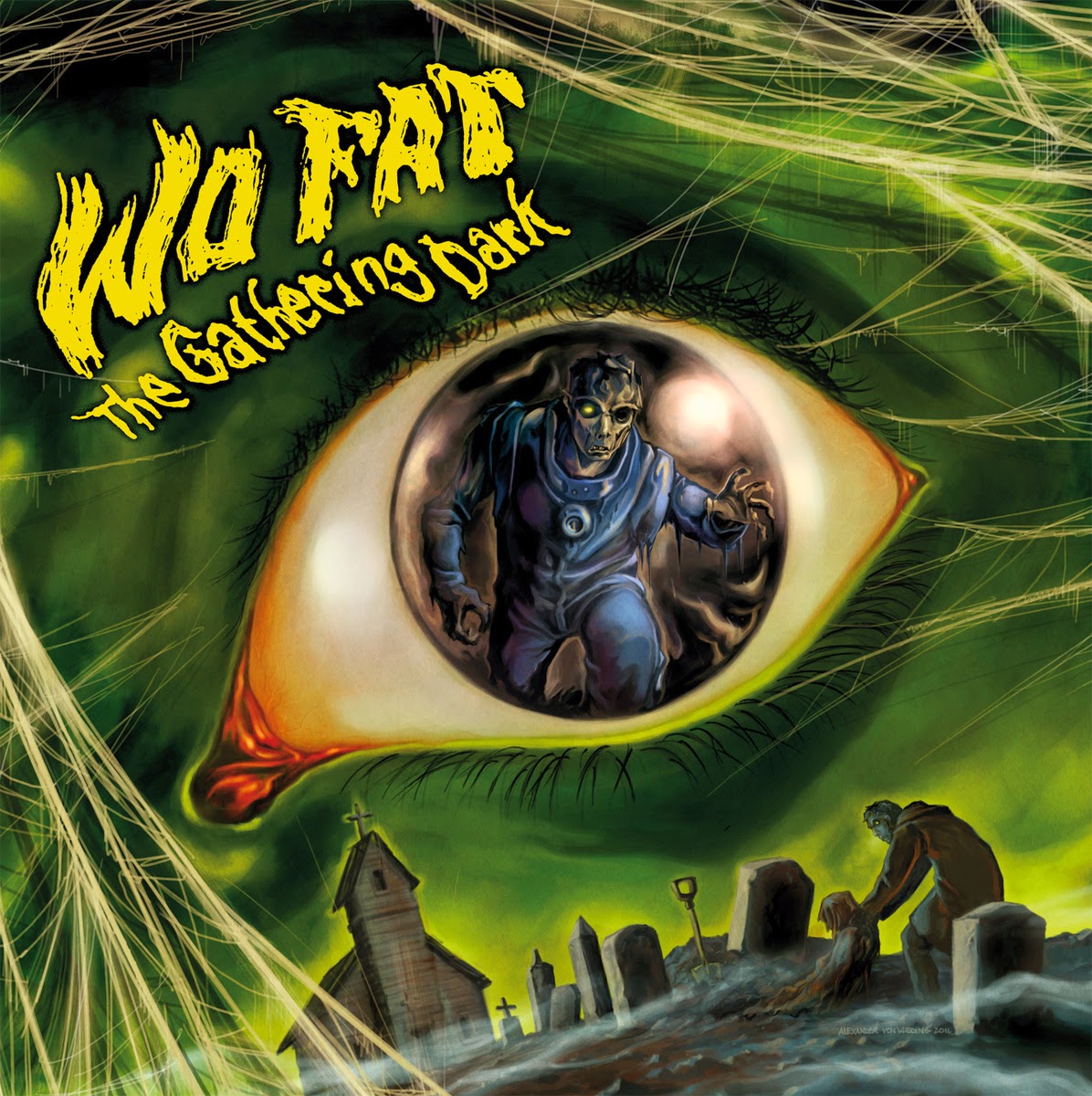

The Gathering Dark, like all of our albums, was recorded at Crystal Clear Sound in Dallas, Texas by me. That album took us the longest to record, partly because we spread it out over a long period of time. Originally we recorded four songs which were for a demo that later became part of The Gathering Dark and the rest of the music, for the most part hadn’t been written yet. As I mentioned earlier, these songs included Matt Watkins as a second guitar player, which gives them a little bit of a different vibe. The rest of the album was recorded later. Being our first record, we were still kind of finding our voice and our style. That being said, I still think it’s a great album. It was recorded on 2” analog tape and like all of our records was mixed old school through a large format analog console. If I remember right, a lot of that album was some of the first stuff mixed with the SSL 4000 console that we installed in the studio right around that time. For those that aren’t recording gearheads, the SSL is one of a couple of ultra-classic, sought-after consoles that are known for being among the best mixing desks ever made.

You followed up your first album with Psychedelonaut in 2008 with Brainticket handling the CD release and Nasoni Records doing the vinyl again. Was the recording of Psychedelonaut very similar to the session(s) for The Gathering Dark? When and where was the Psychedelonaut material recorded? Who recorded it? What kind of equipment was used?
The recording of Psychedelonaut took place throughout the year of 2007 and was very similar to The Gathering Dark recordings. It was also at Crystal Clear Sound and I also engineered it. The sessions were spread out over time, mostly because we were working around the studio schedule. Same gear as far as recording goes, same console. By that time I had gotten my Firebird in addition to the TV yellow Les Paul with P90’s that I already had and used on The Gathering Dark, rewired to the 50’s style Les Paul wiring, which, to me, made a noticeable difference in tone. With Psychedelonaut, we were trying to get a more live, urgent sound. I remember, I had been listening to Fu Manchu In Search Of… and I loved how it felt very live, and how Eddie Glass’s guitar tracks on some songs would just bust into leads and fills and then drop back to rhythm, and we started taking that approach more on Psychedelonaut rather than having a separate lead track.
While I would never go so far as to call Psychedelonaut a concept album there’s numerous references to what seems to be a central theme to the album. Was there any concept or idea that you all had in mind when writing or recording the album? If so can you talk about it?
There’s not really an overarching concept for the album, but there are some recurring themes, like the Psychedelonaut idea about using music as a vehicle for psychedelic journeys and exploration and expansion of the mind. “Enter the Riffian” kind of takes that idea but is also talking about the stagnation of modern mainstream music that’s happened because of corporate profits being the bottom line and driving force behind the major label machine, and my utopian ideal of real, organic, riff driven music as the savior from this. There are also some horror themes and imagery used as metaphors for corporations run amok, among other political themes, which is a recurring theme through much of our music. After we recorded the album we worked out a distribution deal with John Perez of Brainticket Records. This lead to our relationship with Nasoni Records, who, thanks to John, contacted us about releasing Psychedelonaut on vinyl, which, of course, we were thrilled about. Vinyl had been something we had always wanted to do, but had never had the resources to make happen

Three years later you struck back with a vengeance as personified in the Noche del Chupacabra album, and this time with Nasoni handling everything. Can you talk about the recording of Noche del Chupacabra? Who recorded the Noche del Chupacabra material? Where was it recorded at? Who recorded it? What kind of equipment was used?
Noche del Chupacabra was also recorded at Crystal Clear Sound by, you guessed it, me. Same recording gear was used, maybe with a couple small changes, but as always, it was mixed through the analog SSL console. I think by this time, Michael had upgraded his drum kit to the kick ass DW set that he’s got now and Tim got the Ampeg SVT head with the very rare, and very killer sounding, Ampeg Iso-Vent speaker cab, which oddly has two 10” speakers and two 15”s that face each other. I’ve never seen anything like it, but it sounds killer. We were continuing to strive for a very live feel and sound on this record and were also trying to stretch things musically a bit too, even though we still remained within the melodic parameters we’ve always stuck to. We were trying to take things further rhythmically and performance-wise and in some ways get more psychedelic, but also stay heavy; more of a jazz-style approach to playing heavy music. Michael’s drumming is more jazz-like conceptually, and freer, which is something that we had talked about doing. The bass would serve more as the foundational static element in some grooves and the drums would become more of a lead instrument at times. To my mind, a lot of the great 70’s rock drummers were very jazz-like in their playing, Mitch Mitchell, Bill Ward, Carmine Appice and of course Ginger Baker. After Nasoni released Psychedelonaut, we decided to continue to work with them because they were really cool to us and helped us reach a wider audience and expanded our distribution, so we did both the CD and vinyl releases with them. After Noche del Chupacabra, Nasoni released our first album, The Gathering Dark, on double vinyl as well.
Noche del Chupacabra was also recorded at Crystal Clear Sound by, you guessed it, me. Same recording gear was used, maybe with a couple small changes, but as always, it was mixed through the analog SSL console. I think by this time, Michael had upgraded his drum kit to the kick ass DW set that he’s got now and Tim got the Ampeg SVT head with the very rare, and very killer sounding, Ampeg Iso-Vent speaker cab, which oddly has two 10” speakers and two 15”s that face each other. I’ve never seen anything like it, but it sounds killer. We were continuing to strive for a very live feel and sound on this record and were also trying to stretch things musically a bit too, even though we still remained within the melodic parameters we’ve always stuck to. We were trying to take things further rhythmically and performance-wise and in some ways get more psychedelic, but also stay heavy; more of a jazz-style approach to playing heavy music. Michael’s drumming is more jazz-like conceptually, and freer, which is something that we had talked about doing. The bass would serve more as the foundational static element in some grooves and the drums would become more of a lead instrument at times. To my mind, a lot of the great 70’s rock drummers were very jazz-like in their playing, Mitch Mitchell, Bill Ward, Carmine Appice and of course Ginger Baker. After Nasoni released Psychedelonaut, we decided to continue to work with them because they were really cool to us and helped us reach a wider audience and expanded our distribution, so we did both the CD and vinyl releases with them. After Noche del Chupacabra, Nasoni released our first album, The Gathering Dark, on double vinyl as well.
A year later in 2012 The Black Code was your first album that Nasoni didn’t have anything to do with that I know of. Was the recording of the material for The Black Code very different than your previous efforts for Nasoni? Did you know that Nasoni wasn’t going to be involved with the record while you were recording it or was that during post-production? What if anything changed? Who recorded that material? When was it recorded? What kind of equipment did you use?
The Black Code was our first record with Small Stone Records. We had been very happy working with Nasoni, but we thought that we might be able to move things to another level with another label like Small Stone. We’d already signed to Small Stone before we recorded The Black Code, although most of the music had already been written and we were jamming on it during the negotiation period. Same studio, same engineer as before. One thing different guitar-wise, is that I had become an endorser of Lace Pickups, which are heard on all of the guitar tracks on this record. They are some killer pickups, as you can hear on the record. That’s part of the reason for the different sound. Also, with each record, we have streamlined the process a little more each time. We recorded and mixed The Black Code in a much shorter time, between April and June of 2012. We basically continued further down the musical road that we had already started down with Noche del Chupacabra, and it was more of an actual live record than any other album we’d recorded before. Again, trying to find the magical formula of heavy structured riffs, free flowing jams and trancey psychedelia. The reception of The Black Code has been great and I think our affiliation with Small Stone has helped us move to another level.
2013 has been a good year for Wo Fat fans! You put out the split 7” single with Abrahma and from what I understand that was a self-released tour that you made for the Lost Away Across Europe Tour. Can you talk a little about the decision to produce and self-release a single for the tour? Self-releasing producing material seems to be a more and more common occurrence these days and I’m always curios how artists go about accomplishing it and why they come to the decision in the first place.
That was actually Seb from Abrahma’s idea, which was a great idea. We had the tour in the works and it just made sense to share the cost of putting out a limited edition split that we could both sell on the tour. By self-releasing it, once the cost of pressing was recouped, we made all of the profits from it, so it’s a good bonus for touring. Both of us are Small Stone bands and Scott, with Small Stone, thought it was a good idea and was totally cool about us doing it.
Wo Fat contributed the track “Broke Down In Texas” to that Abrahma split single. Was “Broke Down In Texas” something you had previously recorded that had just been looking for a home or did you write and or record it specifically for the single? If it wasn’t from a previous recording session can you tell us where and when it was recorded, who recorded it and what kind of equipment was used?
Ha-ha. That was just a jam. We had a couple predetermined parts and an overall form, but it’s basically just a jam in the studio. Same recording scenario as Black Code. We recorded it in early February of 2013. We basically just recorded a couple of different takes and used the one we liked the most. It’s completely live.
You also released the 12” split with Egypt Cyclopean Riffs on Totem Cat Records in 2013. I know that album is limited to 500 vinyl only copies and that you guys are sold out of it. Is Cyclopean Riffs still in print from Totem Cat at this point? What brought about the recent rash of split releases following your departure from Nasoni?
We’re sold out of it and I think Totem Cat may be sold out to. There’s talk of a second pressing, though, so look for that in the future. We had actually been talking to Totem Cat about doing a split before we even signed with Small Stone, and as I mentioned the Abrahma split was for the European tour. Ewenn, from Totem Cat, and I had been in touch with each other since late 2011. He was carrying some of our stuff in his store, and he was getting the label going and all the bands that he was planning on doing releases with, or was looking into working with, were bands I really dig a lot and we started talking because of our similar interests musically and then he floated the idea of doing a split. Originally there was talk of doing the split with Earthride but that didn’t work out so when Ewenn mentioned the idea of doing it with Egypt, we were thrilled about that. I had been a big fan of their first album and was stoked when I found out they were back together and had a new record, which kicks serious ass, by the way. It took a while to materialize for various reasons, but one of the coolest things about it is that it’s a split 12” rather than a 7” or 10”. This means that it’s almost forty minutes of music. Basically, a full album split between Wo Fat and Egypt.
Can you talk about the recording of the material for Cyclopean Riffs? Have things changed much as far as songwriting or recording goes since The Gathering Dark in 2006? Did you try anything radically new or different with the writing or recording of the material for Cyclopean Riffs? When and where was it recorded? Who recorded it and what kind of equipment was used?
We didn’t really try anything new from a recording standpoint. “Electric Hellhound” was actually recorded during The Black Code sessions, back when we thought it was going to be a 7” split, which was the original plan. When Ewenn told us we could do a 12” split, we wrote “Nameless Cults” and recorded that in November 2012. It’s one of my favorite Wo Fat songs now and I really like how it turned out.
Does Wo Fat have any music that we haven’t talked about yet? Maybe a single I missed or any appearances on any compilations or anything?
I think that covers it all. The vinyl version of Psychedelonaut has a bonus track that’s only available on the vinyl. It’s a cover of the Billy Cobham song “Stratus” that originally featured the great Tommy Bolin on guitar. This is our rendition of that song, and ended up getting left off of the CD because there wasn’t space for it. When we released the double vinyl there was more time available, so I was happy to have a place for this tune. The vinyl version of The Gathering Dark also has a vinyl only bonus track, “The Call of Zuvembie” which was a jam that we did in rehearsal one night that was really cool.
With the release of Cyclopean Riffs and the Abrahma split single this past year, are there any releases in the works or on the horizon at this point?
We are actually just finished our new album for Small Stone, entitled The Conjuring, which will be released in April/May 2014. I’m really excited about the new album. Like all of those before, I think each time we refine our vibe a little more and I think we’re grooving more and the synergy between us is better than ever. It’s a very groovy, but also heavy and dark record. We’re also doing a special split 7” that will only be released with a book that’s being written about Nasoni Records. I just found out the book will be released at the Freak Valley Festival in May. The split will be a song from Wo Fat and a song from The Re-Stoned, which I’m very stoked about since I think they’re a bitchin’ band! This will be a song from us that is exclusive to this 7” release. Ilya, from The Re-Stoned, is also going to contribute a guest guitar solo to our song and I did a guitar solo for a song on their next album, too.
You released your first three albums on Nasoni but Small Stone Records handled the release of your latest album The Black Code. Do you plan on continuing to release albums with Small Stone Records? I’m curious whether you’re in the process of forging another one of those long lasting relationships or looking for a new home right now? I know you self-released the tour single split with Abrahma and Totem Cat Records released Cyclopean Riffs but you had a pretty strong relationship with Nasoni for several years, or at least it seems that way since you released three albums on the label ha-ha!
We had a great relationship with Nasoni, and still do. We are very grateful to them for all that they’ve done for us and really, they were instrumental in getting us some international exposure and helping to get a bit of notoriety. I think they’re a really cool label and I dig how Nasoni is way into vinyl and how that has always been their focus. We’re also very happy with how things have gone with Small Stone. The new album, The Conjuring, will be released on Small Stone this spring. For me, I’m thrilled and honored, that we’ve been lucky enough to have our music released on a couple different labels that have put out so many iconic and great records that are part of our genre. And I include Totem Cat too, because, even though the label is very young, Ewenn has already released some serious records and I think he’s building a very solid label.
Where’s the best place for our US readers to pick up copies of your albums?
You can buy directly from our online store. We try to keep all of our music in stock and we’ve got a number of rockin’ t shirt designs and hats, patches, etcetera. Just go to our website and click the “Store” link.
With the completely insane international postal rate increases this last year I try to provide our overseas and international readers with as many options as possible for picking up imports. There’s nothing worse than being able to afford an album but not being able to pick it up because shipping is literally going to cost more than the LP itself! Where’s the best place for our international readers to pick up copies of your music?
We will ship internationally, but you can also buy our music overseas. Kozmik-Artifactz in Germany usually has our stuff in stock, Totem Cat’s online store also carries our albums. You can buy the first three records directly from Nasoni and Von Grimm Records is a good option for Australians.
And where’s the best place for fans to keep up with the latest news from Wo Fat, like upcoming shows and album releases at?
The most up to date info is going to be on our Facebook page, Twitter, or our website. Facebook usually gets updated first before anything else.
Do you all enjoy touring? Do you spend a lot of time on the road? What’s it like for Wo Fat on the road?
We enjoy touring, but we don’t do a whole lot of it. The three of us own and run a recording studio in Dallas so we can’t afford to be away too long. We try to play strategic shows on the road, rather than spending tons of time on the road.
What do you have planned as far as touring goes for the 2014 so far?
We’re heading back to Europe this spring and we’ll be doing a two week tour that includes an appearance at the Freak Valley festival in Germany. We’re still solidifying some of the dates, but I know that we’ll be hitting London, Paris, Berlin, Warsaw, Madrid, Barcelona and some other places in between. We’ll also be doing a couple Small Stone Showcases in Boston and New York in March that have pretty killer lineup of bands, which will be our first time playing the east coast and we’ll probably think about some short regional tours after we get back from Europe.
Do you remember what the first song that Wo Fat ever played live was? If so, where and when was that?
I don’t remember exactly what the first song was, but I remember the gig. It was at a club in Dallas called The Curtain Club and I think it must’ve been around 2005. Actually, now that I think about it, I think we probably started the set with “From Beyond”. Back in the early days, that was the set opener and then a little later, it became the standard set closer for a long time. “From Beyond” was one of the first songs I wrote for Wo Fat.
You have played with some seriously awesome bands over the years! Who are some of your personal favorites that you’ve had a chance to share a bill with?
We’ve had the chance to play with a lot of bands that I love and that have really influenced me a lot. This last year especially. Desertfest in London was pretty bad ass because we got to play right before Ufomammut, who is somebody that I’ve wanted to see live for a long time. We got to play with Egypt in Kansas City which was great. Las Cruces is another amazing band that I love that we’ve gotten to play with a number of times. We also had a great little mini-tour last March playing a few nights in a row with Freedom Hawk and Lord Fowl. The last night of that was the first Fuzzed Out! Festival in Fort Worth that I helped to put together, whixh also included Ape Machine. We’ve gotten to play with Dixie Witch, Tia Carrera and Lo Pan a few times too, which is always kick ass. We played an amazing show with Weedeater once in this tiny little club in Dallas. They were earthshakingly loud and just destroyed. Some other great bands that come to mind that we’ve played shows with are St Vitus, they absolutely killed it that night, Kylesa, Stone Axe and Alabama Thunderpussy.
Do you have any funny or interesting stories from live shows or performances that you’d like to share here with our readers?
When we played in Paris this last tour, we played at a club called Les Combustibles, which I think is no longer open. I think they called it that because when it was packed with people, like it was this particular night, it would get so hot the walls would sweat. It was a pretty killer show that night. The crowd was amazing, the lineup was awesome, Witch Mountain and Cough were on the bill with us, and it was one of the craziest shows of the tour. The building that Les Combustibles was in had apartments on the upper floors and we had to load out through the front door onto the street out front. After the show while we were loading out, somebody that worked at the club warned us to stay underneath the awning that was at the front door because there was a lady that lived in one of the apartments above that would throw water down on people because she was pissed about the noise. Of course, we had to go out from underneath the awning to get to the van, so we weren’t completely protected. Well, this particular night, she stepped it up a notch and threw glass jars of turpentine down at us while we were trying to load our gear into the van. Tim, our bass player got some glass shrapnel in his leg and a big shard of turpentine-soaked glass was stuck into his bass case. Completely insane! It was very bizarre, but I like to think that it was such a rocking show it just sent her over the edge!
With all of the various mediums available to musicians today I’m always curious why they choose the particular methods that they do. Do you have a preferred medium of release for your own music? What about when you are listening to or purchasing music; if so, why?
We definitely prefer vinyl. It sounds better and the artwork is bigger than a CD, and of course mp3s barely have any artwork at all other than the little thumbnail that you see in iTunes. I love the way vinyl sounds, it has so much more dimension and depth than CD and especially mp3.
Do you have a music collection at all? If so can you tell us a little bit about it?
I most definitely have a music collection. As I said, I grew up with vinyl, so I have a bunch of vinyl, some that I’ve had for twenty years. I’ve got a lot of CDs as well. My collection reflects my musical journey in life quite a bit. I’ve got a lot of jazz records, bebop from the 40’s-50’s, 60’s modal and free jazz and 70’s fusion, blues, lots of 70’s funk and 70’s rock. In the last ten years or so I’ve been searching out a lot of the more obscure heavy 70’s albums, which I love to find on vinyl. Things like Stray Dog, Blues Creation, and Cactus which are fairly easy to find on vinyl, Point Blank, Mahogany Rush, Black Cat Bones, etcetera. There’s also some great punk/hardcore in my collection and of course, lots of stoner rock/doom. I’ve got some Cuban/Puerto Rican/Salsa records that I really dig as well. During the 70’s there was some really cool hybrid funk-salsa music happening that I’m into.
I grew up around a fairly sizable collection of music and have had an appreciation for physical music since I was a young child. I loved being able to snatch something completely randomly off of the shelf and put on the album, read the liner notes, stare at the artwork and just let it transport me to another world. Having something to hold in my hands, artwork to look at and liner notes to help give you a rare, brief glimpse into the minds of the artists that created it and make for a more complete listening experience, at least for me. Do you have any such connection with physically released music?
Without a doubt! I grew up with vinyl and I remember hanging out listening to records and being enthralled with the cover while listening to the music. To me, that’s part of the experience. The cover art should set a mood and vibe for the record, and help guide the listener to the mental place you want them to be in to listen to and absorb your music. That’s our philosophy with the art for our albums. I also like having an album in physical form, whether it’s vinyl or CD. I feel like I don’t really own it if I just have mp3s on a hard drive. And, you know, I’ve also found that for whatever reason, I’ll listen to an album more, or give an album more of a chance, if I have it in a physical form. Somehow, I think you’re making more of a commitment to the music.
As much as I love my music collection there’s always the good with the bad. I could just never take enough of it on the go with me before. Digital music has taken care of that problem to a large extent though, and when teamed with the internet has proven to be a real game changed. While it’s exposing people to a whole world of music that they otherwise wouldn’t be privy to, illegal downloading is running rampant and it’s even more difficult to get noticed in the chocked digital jungle out there. As a musician during the reign of the digital era, what’s your opinion on digital music and distribution?
Yeah, it’s really kind of a double-edged sword. There are so many positives about the way the internet and digital world has changed things in terms of self-promotion for bands and also giving musicians avenues for distribution that weren’t available before. I think that having a strong online presence is as important as touring and for a band like us, who isn’t able to be on the road all the time, the internet has been vital in reaching out and connecting with the international online stoner rock community. It’s also very convenient to be able to put a bunch of music on your phone and take it with you. The illegal downloading thing is very disturbing, though. I don’t have a problem with somebody passing a copy of something on to their friend. I have been turned on to lots of music from friends over the years with burned CD-Rs, and of course cassette tapes way back in the day, and it doesn’t bother me if somebody burns a copy of a Wo Fat CD and gives it to a friend. But it’s a whole different thing to upload an album and let anybody who comes along download it. That’s like burning 500 CD-Rs and leaving them on the street corner for anyone that comes along to grab. It’s a different thing entirely to me. Maybe the most disturbing part of this trend, though, is that it’s spreading this attitude that music should be free and nobody should have to pay for it. What people don’t realize is that it costs money to create music. It costs money to have good gear, amps, guitars, drums, etcetera. Making a good sounding record is expensive. Making a crappy sounding record even, still costs money. It costs money to have artwork made, to get photos taken, to get a physical product manufactured. And even if these things were free, this is people’s art and hard work that we’re talking about here, and if you’re going to partake and enjoy that, I would think that you should feel like you owe something to the creator of that art that gives you this entertainment and enjoyment. Recognition of the value of creativity and intellectual property is being diminished more and more these days. I’m not in this for the money and I’m not saying these things out of greed, because there isn’t much money to be made from it and very few people in this genre are making a living solely from their bands. We do it because we love the music and want to play our music, but finished albums don’t just magically appear out of thin air.
I try to keep up with as much good music as I possibly can, I spend hours every week messing around online looking for something new and I head into the local shop at least once a week to peruse the new arrivals and get recommendations from the guys that work there. A lot of the best tips I get come from musicians like you though! Is there anyone from your local scene or area that I should be listening to that I might not have heard of before?
When it comes to bands, we have a very strong scene, not only here in the Dallas-Fort Worth area, but in Texas in general. Some great bands, both locally and from around Texas that we dig and enjoy playing with are: Southern Train Gypsy, Mothership, Orthodox Fuzz, Cosmic Trigger, Stone Machine Electric, Big Sandy Gilmer, Smoking Spore, From Beyond, Project Armageddon, Linus Pauling Quartet, Destroyer of Light, Dirty Seeds, Switchblade Jesus, Sons of Bitches, Las Cruces, Maneaters of Tsavo, and there’re many more that I’m forgetting at the moment.
What about nationally and internationally?
There’re so many kick ass bands around now, and I’m not an expert on the more obscure bands, but I’ll mention some of the bands that I’m really digging a lot right now that are maybe a little less widely known. Tombstones, Maligno, Harsh Toke, Mendozza, Dark Earth, Arrowhead, The Disease Concept, Sonora Ritual, Humulus, Geezer, The Re-Stoned who I just played a guitar solo for the new album for, Captain Crimson, Chrongoblin, and many, many more that I’m sure I’m forgetting.
Thanks so much for taking the time to make it through this, I know it wasn’t short and I can’t imagine it was easy to answer; I know it wasn’t short or easy to write! Is there anything that I missed or that you’d just like to take this opportunity to talk about?
I’ve mentioned it already, but I’ll mention it again, our newest album, The Conjuring, will be coming out in the US on June 17. It will actually be out sooner than that in Europe and we’ll have it for sale on our merch table when we’re on tour in Europe.
– Roman Rathert
DISCOGRAPHY
(2006) Wo Fat – The Gathering Dark – digital, CD, 2×12” – Red Menace(CD)/Nasoni Records(12”) (Vinyl limited to 400 copies on Black Vinyl, 100 copies on Yellow/Blue Vinyl. 12” version includes unreleased track “Call Of Zuvembie”)
(2008) Wo Fat – Psychedelonaut – digital, CD, 2×12” – Brainticket(CD)/Nasoni Records(12”) (Vinyl limited to 400 copies on Black Vinyl, 100 copies on Red Vinyl. 12” version includes unreleased track “Stratus”)
(2011) Wo Fat – Noche del Chupacabra – digital, CD, 2×12” – Nasoni Records (Vinyl limited to 400 copies on Black Vinyl, 100 copies on Orange Marble Vinyl)
(2012) Wo Fat – The Black Code – digital, CD, 2×12” – Small Stone Records (1st Pressing: 150 Black, 175 Opaque Orange, 175 Transparent Blueish-Green, 2nd Pressing: 250 Solid Yellow, 250 Transparent Tangerine Gold
(2013) Wo Fat/Abrahma – “Broke Down In Texas” b/w “War” – 7” – Self-Released (Sold during the “Lost Away Across Europe Tour” in April 2013, limited to 250 copies)
(2013) Wo Fat/Egypt – Cyclopean Riffs – 12” – Totem Cat Records (Limited to 500 copies on Clear Grey Haze Vinyl)
(2014) Wo Fat – The Conjuring – TBA – Small Stone Records – Release date – June 17, 2014 (USA), May 2014 (Europe)
Array

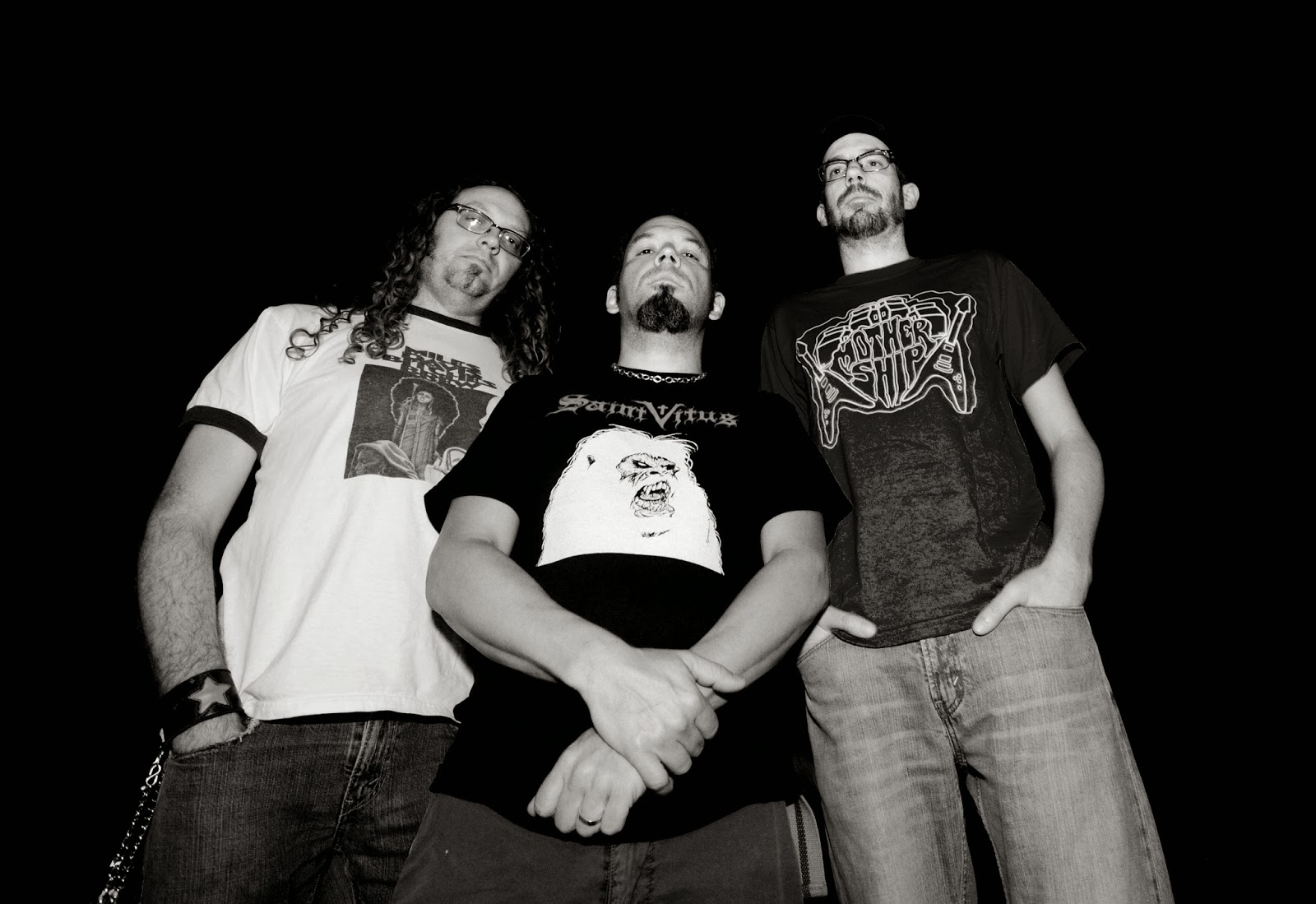
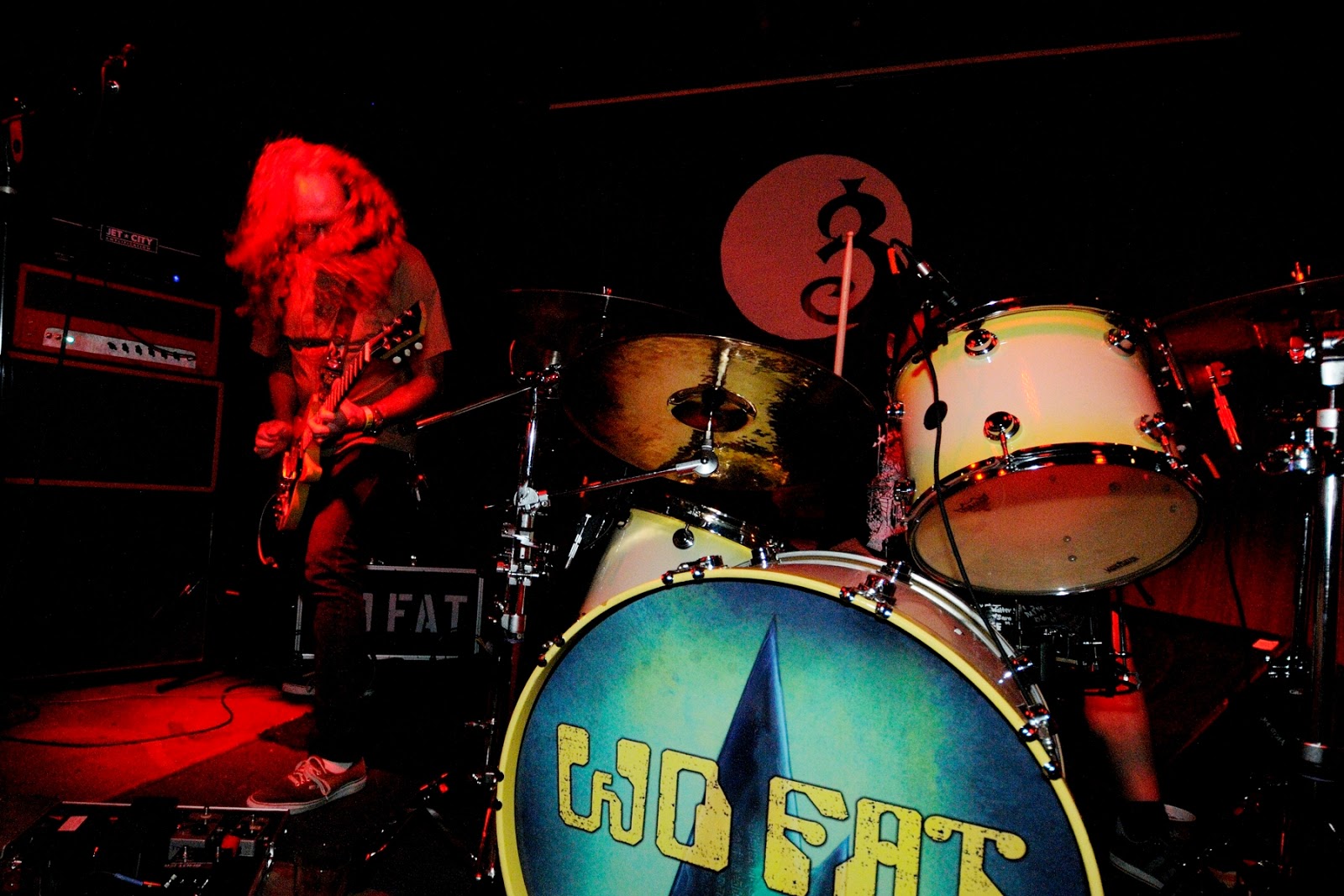
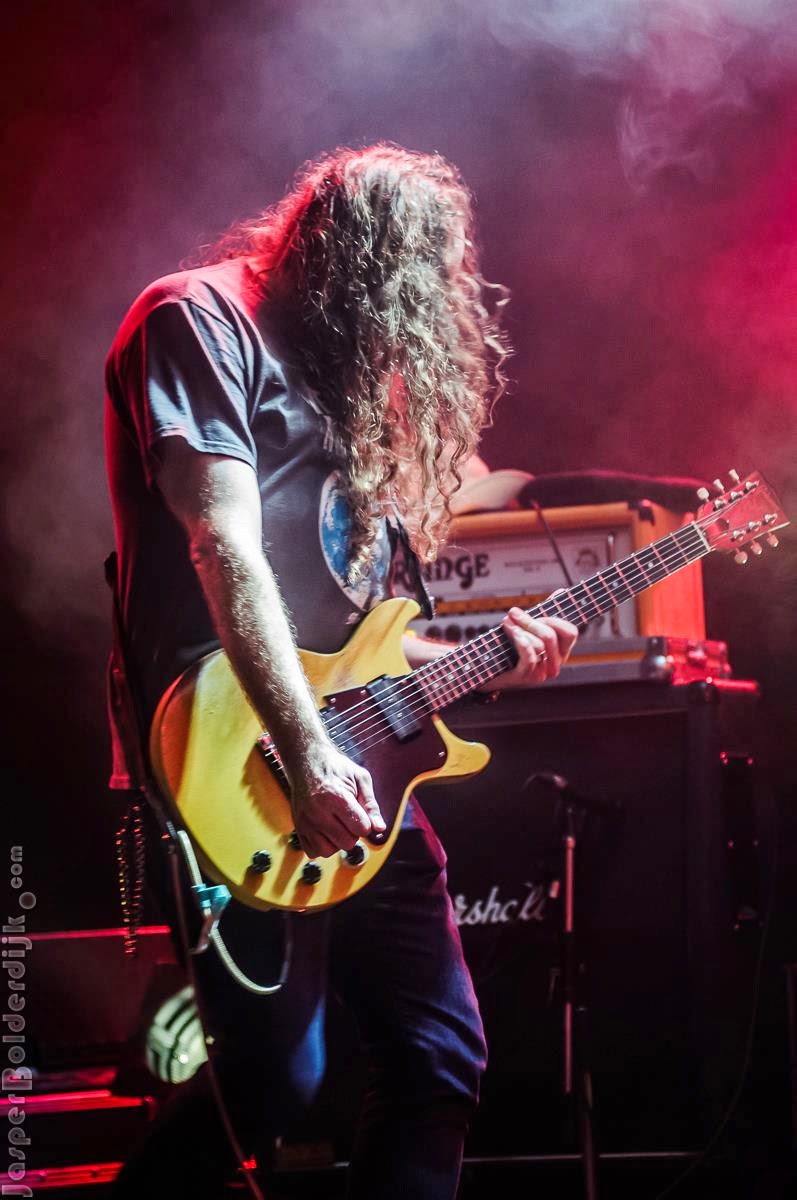
.jpg)

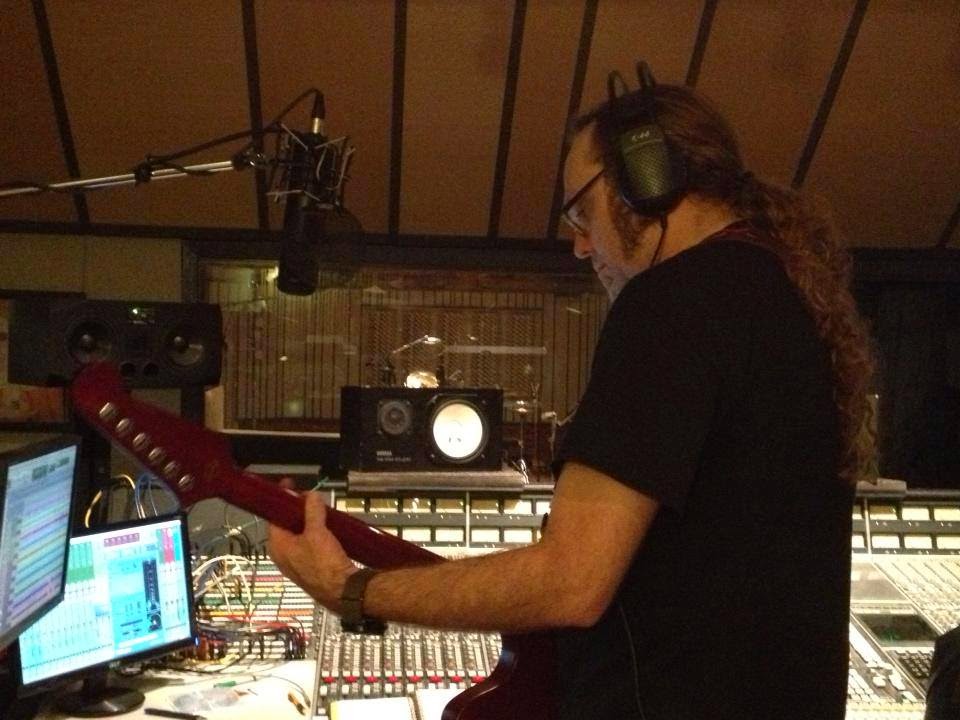
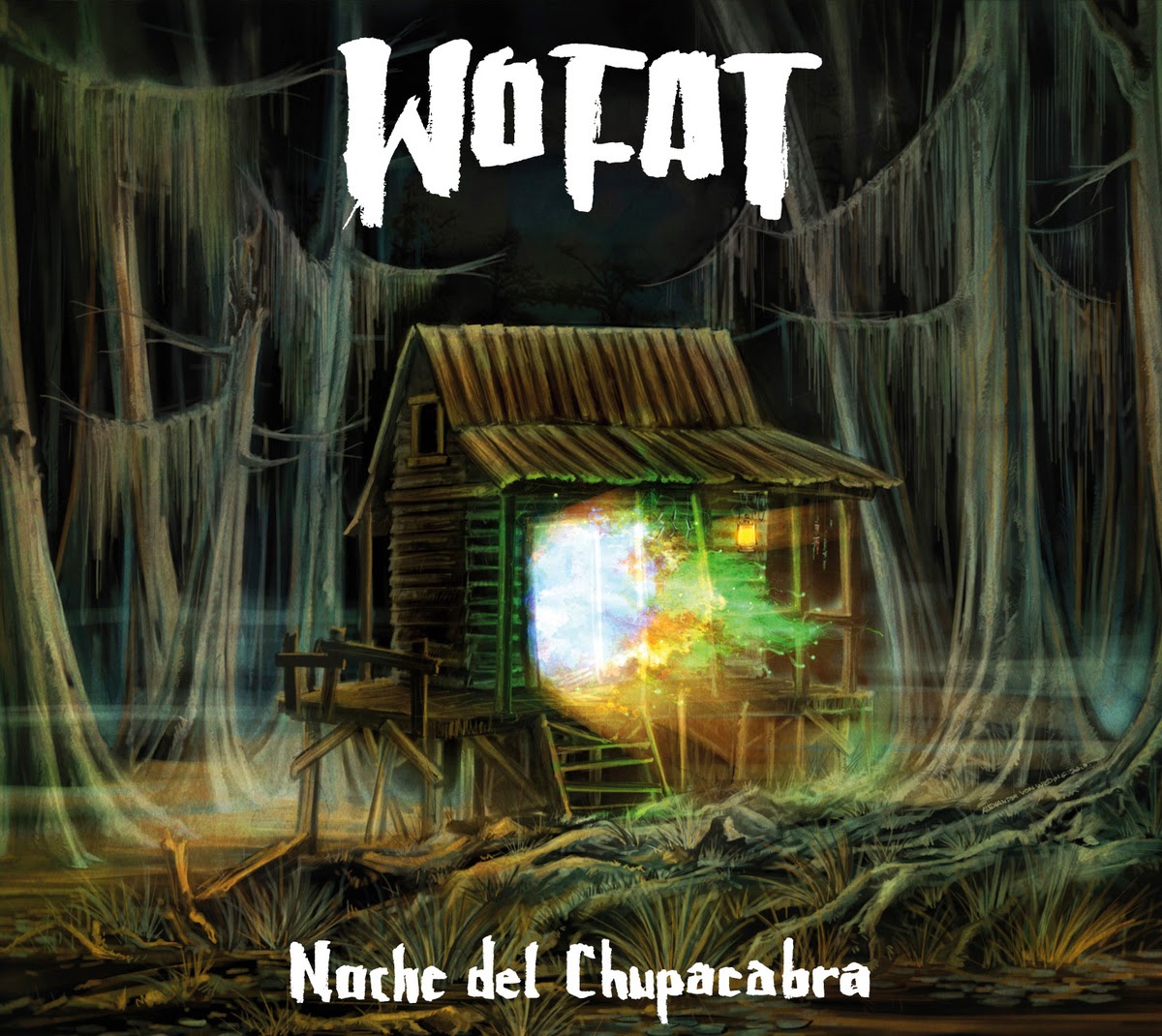
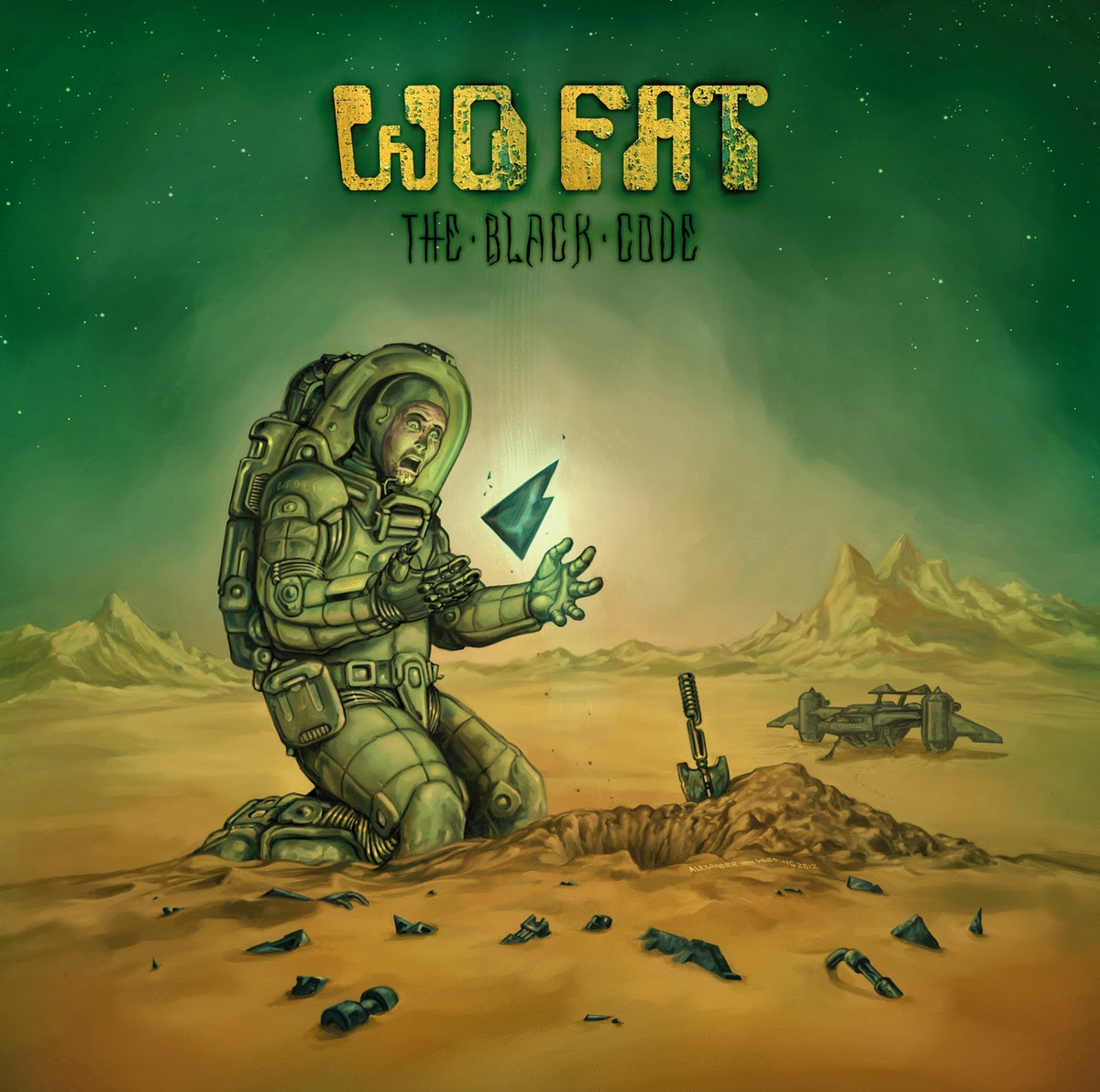
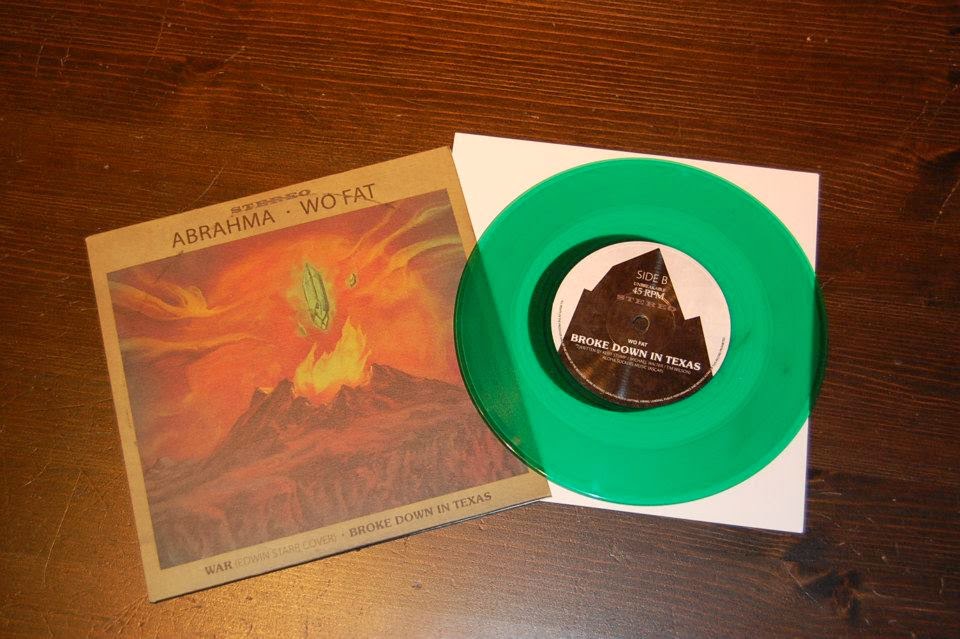
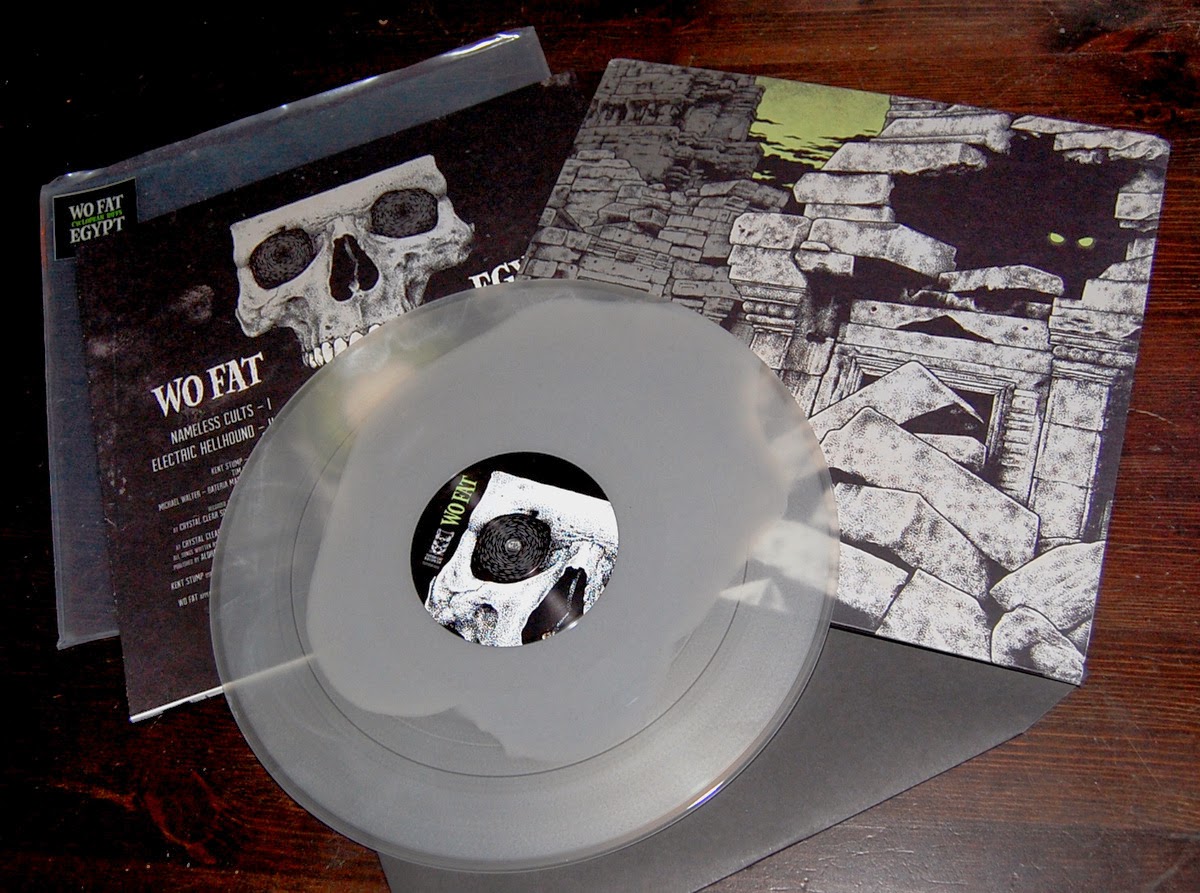

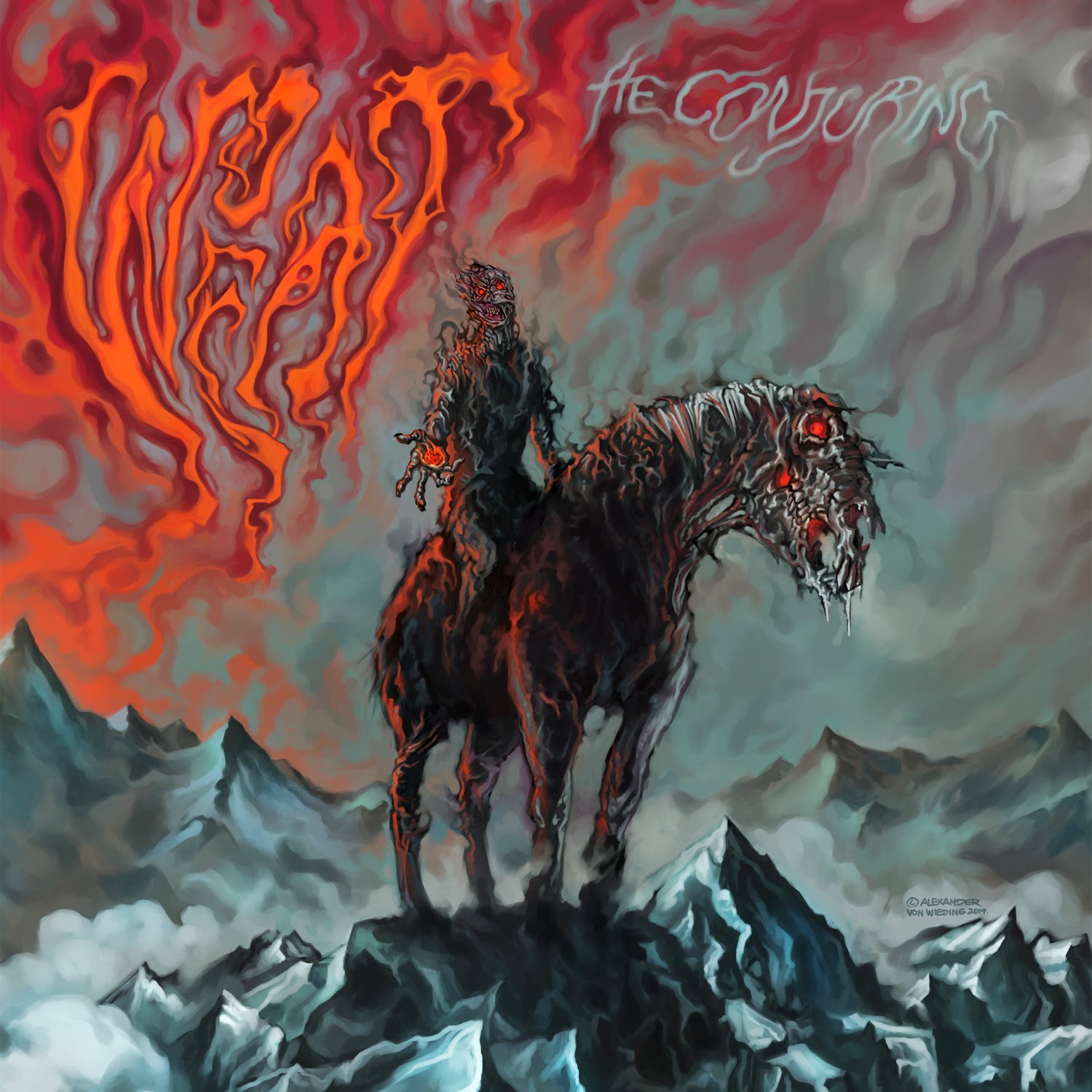
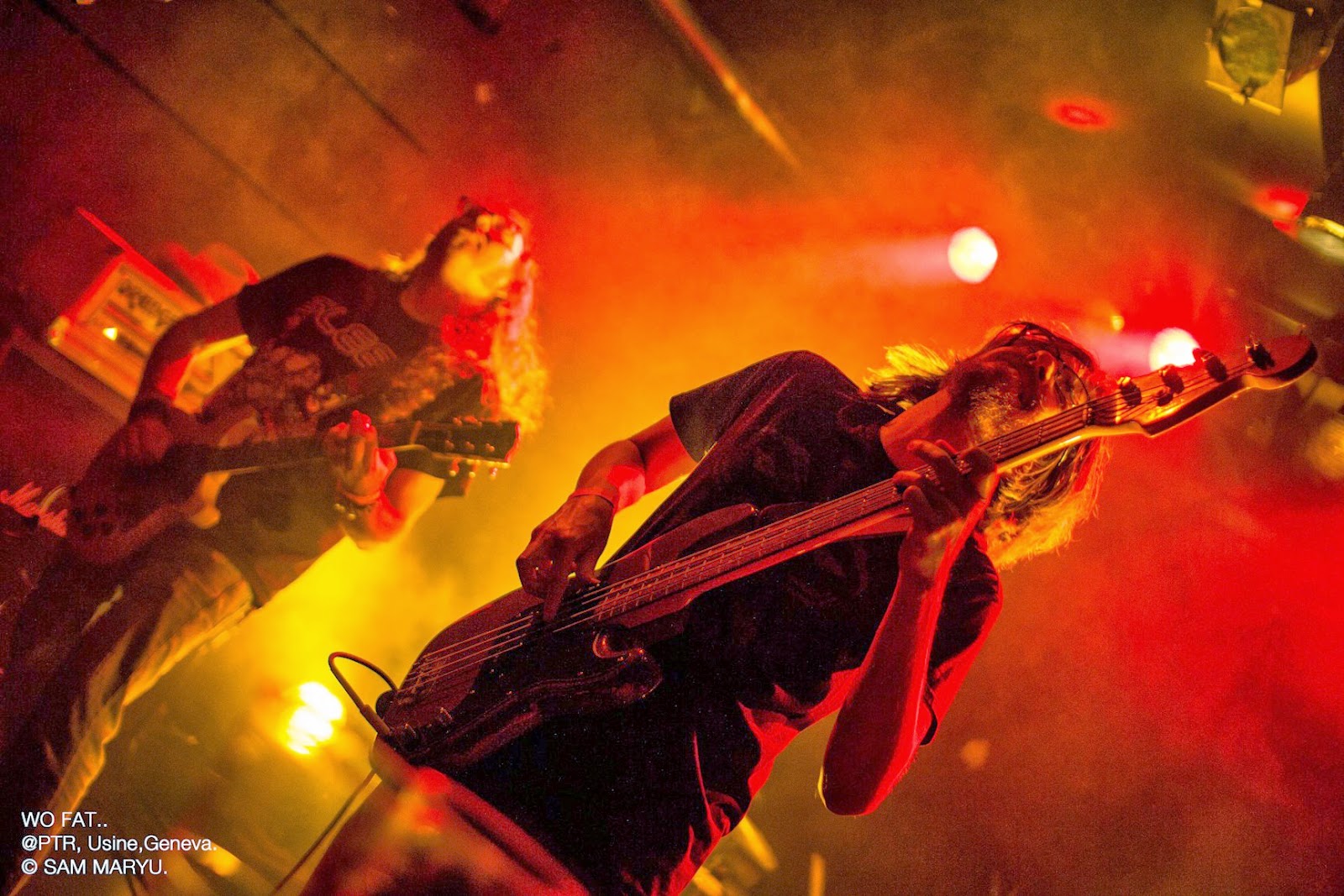
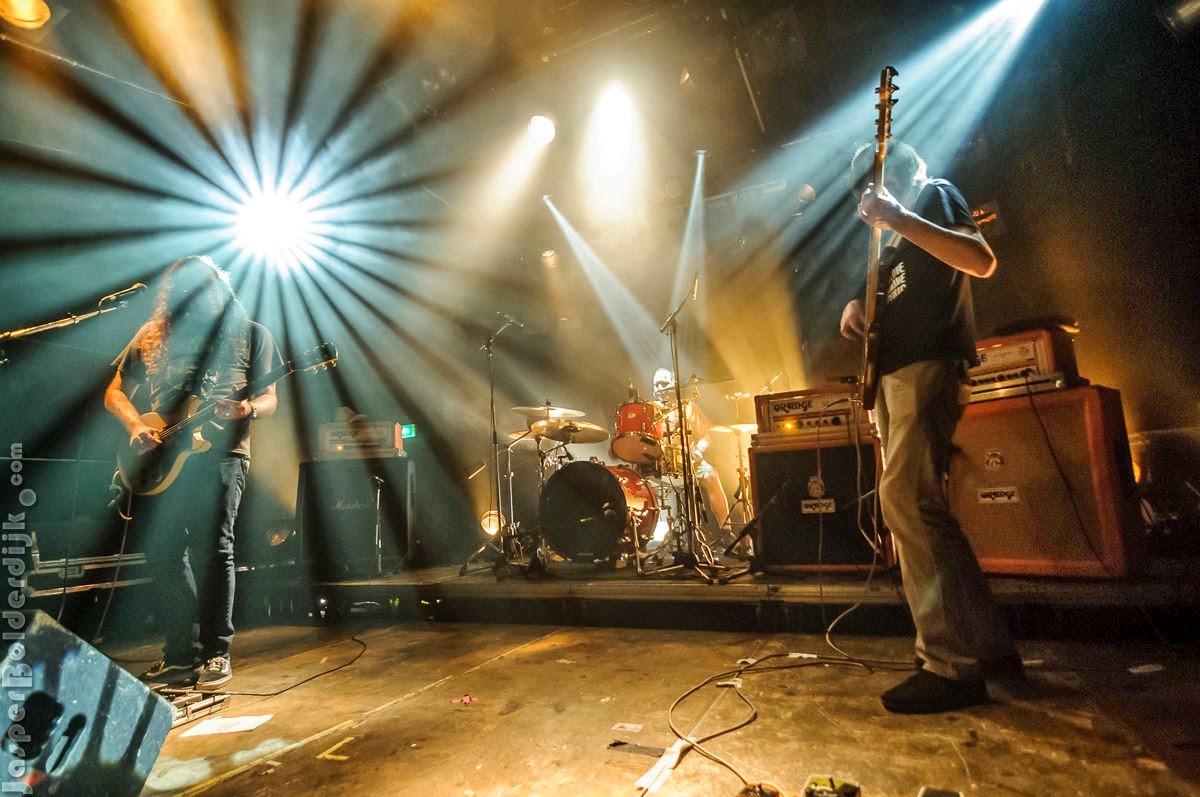
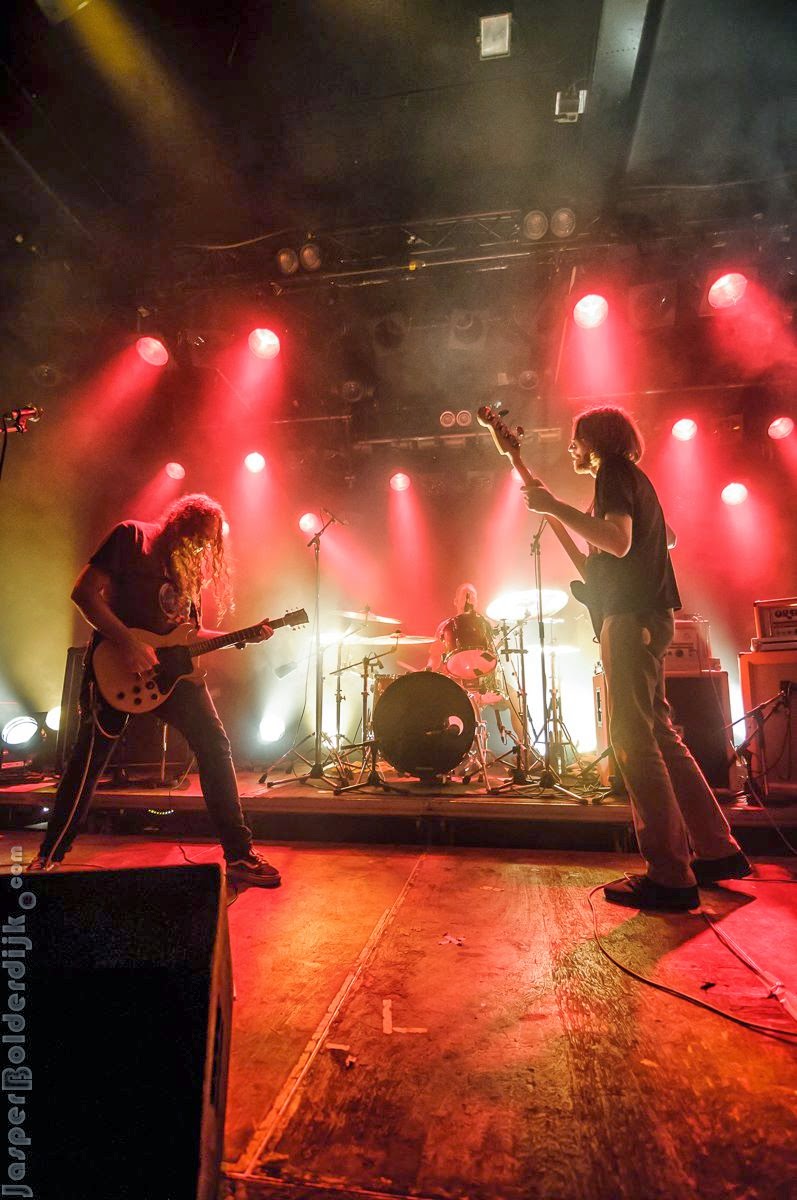
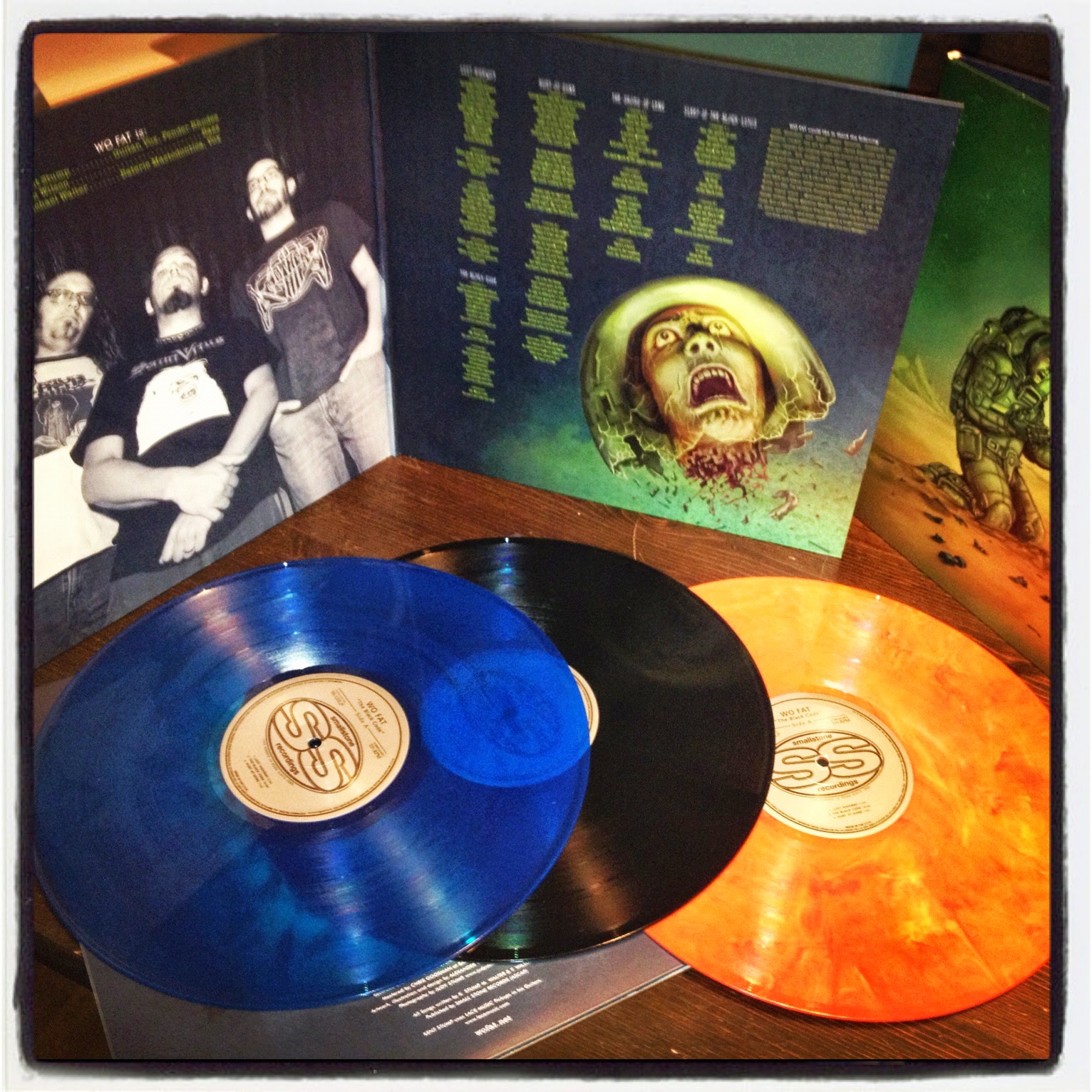
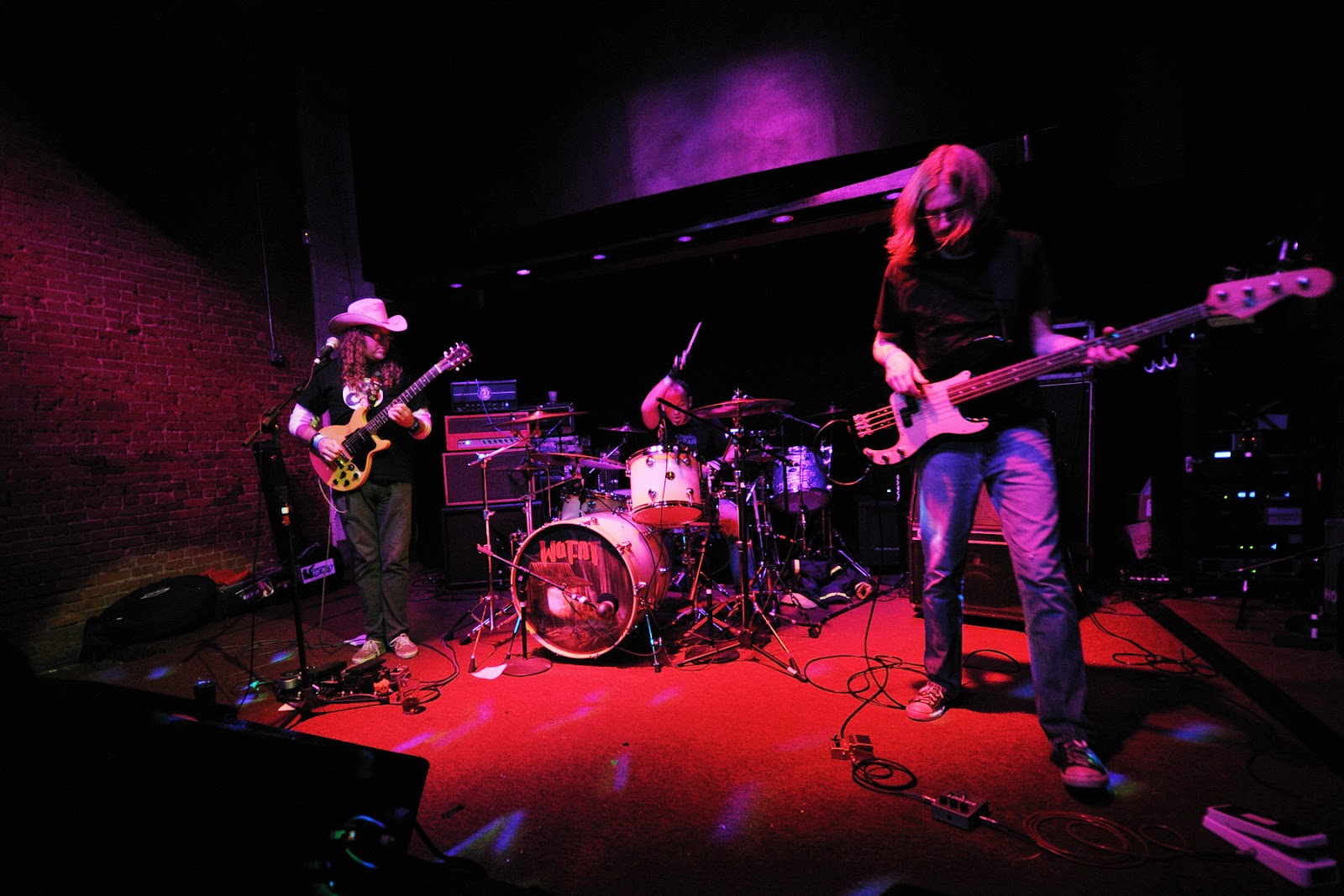



Great interview! Wo Fat were awesome at Desertfest last year, rock on guys!